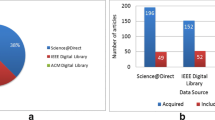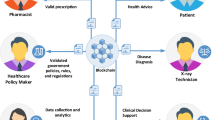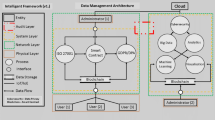Abstract
Group decision making (GDM) involving consensus reaching process (CRP) attempts to achieve a consensus among Decision-Makers (DMs) before coming to a final decision. Computer-based decision support systems are present to support the decision-making process called the Group Decision Support Systems (GDSS). The traditional GDSS being centralized is subject to security, transparency, and trust issues, such as vulnerable to security risks providing attackers with a single target to attack, a single point of failure, and biases. In this regard, this paper identifies and discusses such issues. To address these issues, we introduce a novel idea of a decentralized group decision-making structure using blockchain technology. We proposed a consensus model suitable for the blockchain platform. For validation, we implement the proposed work using the Ethereum blockchain. Furthermore, a theoretical security analysis of the proposed model is also done to validate that the system eliminates possible security attacks. The possible experiments show that the proposed work minimizes the gas cost by minimizing the feedback cost. To the best of our knowledge, this work is the first step toward introducing the idea, and the advanced approaches will be the natural consequences of this work.










Similar content being viewed by others
References
Herrera-Viedma E, Cabrerizo FJ, Kacprzyk J, Pedrycz W (2014) A review of soft consensus models in a fuzzy environment. Inf Fusion 17:4–13
Li Y, Zhang H, Dong Y (2017) The interactive consensus reaching process with the minimum and uncertain cost in group decision making. Appl Soft Comput 60:202–212
Zhang H, Zhao S, Kou G, Li C-C, Dong Y, Herrera F (2020) An overview on feedback mechanisms with minimum adjustment or cost in consensus reaching in group decision making: research paradigms and challenges. Inf Fusion 60:65–79
Parreiras RO, Ekel PY, Martini JSC, Palhares RM (2010) A flexible consensus scheme for multicriteria group decision making under linguistic assessments. Inf Sci (Ny) 180(7):1075–1089
Kacprzyk J, Fedrizzi M (1988) A ‘soft’measure of consensus in the setting of partial (fuzzy) preferences. Eur J Oper Res 34(3):316–325
Mata F, Martínez L, Herrera-Viedma E (2009) An adaptive consensus support model for group decision-making problems in a multigranular fuzzy linguistic context. IEEE Trans Fuzzy Syst 17(2):279–290. https://doi.org/10.1109/TFUZZ.2009.2013457
Zadrożny S, Kacprzyk J (2003) An internet-based group decision and consensus reaching support system. In: Applied decision support with soft computing. Springer, Cham, pp. 263–276.
Palomares I, Martinez L (2013) A semisupervised multiagent system model to support consensus-reaching processes. IEEE Trans Fuzzy Syst 22(4):762–777
Carvalho G, Vivacqua AS, Souza JM, Medeiros SPJ (2008) LaSca: A large scale group decision support system. In: 2008 12th International Conference on Computer Supported Cooperative Work in Design, pp. 289–294.
Palomares I, Martínez L, Herrera F (2014) MENTOR: A graphical monitoring tool of preferences evolution in large-scale group decision making. Knowledge-Based Syst 58:66–74
Urena R, Chiclana F, Herrera-Viedma E (2020) DeciTrustNET: a graph based trust and reputation framework for social networks. Inf Fusion 61:101–112
Li X, Zheng Z, Dai H-N (2021) When services computing meets blockchain: challenges and opportunities. J Parallel Distrib Comput 150:1–14
Salah K, Rehman MHU, Nizamuddin N, Al-Fuqaha A (2019) Blockchain for AI: review and open research challenges. IEEE Access 7:10127–10149
“The Facebook and Cambridge Analytica scandal, explained with a simple diagram.” https://www.vox.com/policy-and-politics/2018/3/23/17151916/facebook-cambridge-analytica-trump-diagram. Accessed May 07, 2023.
Xie S, Zheng Z, Chen W, Wu J, Dai H-N, Imran M (2020) Blockchain for cloud exchange: a survey. Comput Electr Eng 81:106526
Srivastava HK, Yadav R, Baranwal G (2021) Service Selection using Ethereum. In: IEEE International Black Sea Conference on Communications and Networking (BlackSeaCom) 2021, pp 1–3
Lu Y, Xu Y, Herrera-Viedma E, Han Y (2021) Consensus of large-scale group decision making in social network: the minimum cost model based on robust optimization. Inf Sci (Ny) 547:910–930
Chen Y, Li Q, Wang H (2018) Towards trusted social networks with blockchain technology. arXiv Prepr. arXiv1801.02796.
Bai Y, Hu Q, Seo S-H, Kang K, Lee JJ (2021) Public participation consortium blockchain for smart city governance. IEEE Internet Things J 9(3):2094–2108
Christidis K, Devetsikiotis M (2016) Blockchains and smart contracts for the internet of things. Ieee Access 4:2292–2303
Pérez IJ, Cabrerizo FJ, Alonso S, Herrera-Viedma E (2013) A new consensus model for group decision making problems with non-homogeneous experts. IEEE Trans Syst Man Cybern Syst 44(4):494–498.
Herrera-Viedma E, Herrera F, Chiclana F (2002) A consensus model for multiperson decision making with different preference structures. IEEE Trans Syst Man Cybern A Syst Humans 32(3):394–402.
Zhang H, Dong Y, Chiclana F, Yu S (2019) Consensus efficiency in group decision making: acomprehensive comparative study and its optimal design. Eur J Oper Res 275(2):580–598
Dong Y, Xu Y, Li H, Feng B (2010) The OWA-based consensus operator under linguistic representation models using position indexes. Eur J Oper Res 203(2):455–463
Zhang Z, Guo C (2016) Consistency and consensus models for group decision-making with uncertain 2-tuple linguistic preference relations. Int J Syst Sci 47(11):2572–2587
Mata F, Chiclana F (2005) A consensus support system model for group decision-making problems with multigranular linguistic preference relations. IEEE Trans Fuzzy Syst 13(5):644–658
Tang M, Liao H, Xu J, Streimikiene D, Zheng X (2020) Adaptive consensus reaching process with hybrid strategies for large-scale group decision making. Eur J Oper Res 282(3):957–971
Liu Y, Liang C, Chiclana F, Wu J (2017) A trust induced recommendation mechanism for reaching consensus in group decision making. Knowledge-Based Syst 119:221–231
Gupta M (2017) Consensus building process in group decision making—an adaptive procedure based on group dynamics. IEEE Trans Fuzzy Syst 26(4):1923–1933
Dong Q, Cooper O (2016) A peer-to-peer dynamic adaptive consensus reaching model for the group AHP decision making. Eur J Oper Res 250(2):521–530
Wu X, Liao H (2019) A consensus-based probabilistic linguistic gained and lost dominance score method. Eur J Oper Res 272(3):1017–1027
Herrera-Viedma E, Herrera F, Chiclana F, Luque M (2004) Some issues on consistency of fuzzy preference relations. Eur J Oper Res 154(1):98–109
Orlovsky S (1978) Decision-making with a fuzzy preference relation. Fuzzy sets Syst 1(3):155–167
Świtalski Z (1999) Rationality of fuzzy reciprocal preference relations. Fuzzy Sets Syst 107(2):187–190
Aggarwal S, Kumar N (2021) Blockchain 2.0: smart contracts. Adv Comput 121:301–322.
Lin X (2017) Semi-centralized blockchain smart contracts: centralized verification and smart computing under chains in the ethereum blockchain. Dep. Inf. Eng. Natl. Taiwan Univ, Taiwan, ROC
Vacca A, Di Sorbo A, Visaggio CA, Canfora G (2021) A systematic literature review of blockchain and smart contract development: techniques, tools, and open challenges. J Syst Softw 174:110891
Bellini E, Iraqi Y, Damiani E (2020) Blockchain-based distributed trust and reputation management systems: a survey. IEEE Access 8:21127–21151
Cabrerizo FJ, Pérez IJ, Herrera-Viedma E (2010) Managing the consensus in group decision making in an unbalanced fuzzy linguistic context with incomplete information. Knowledge-Based Syst 23(2):169–181
Choudhury AK, Shankar R, Tiwari MK (2006) Consensus-based intelligent group decision-making model for the selection of advanced technology. Decis Support Syst 42(3):1776–1799
Kacprzyk J, Zadrożny S (2010) Soft computing and web intelligence for supporting consensus reaching. Soft Comput 14(8):833–846
Palomares I, Liu J, Xu Y, Martínez L (2012) Modelling experts’ attitudes in group decision making. Soft Comput 16(10):1755–1766
Palomares I, Rodríguez RM, Martínez L (2013) An attitude-driven web consensus support system for heterogeneous group decision making. Expert Syst Appl 40(1):139–149
Saad M, Spaulding J, Njilla L, Kamhoua CA, Nyang D, Mohaisen A (2019) Overview of attack surfaces in blockchain. Blockchain Distrib. Syst. Secur., pp. 51–66.
Li G, Kou G, Peng Y (2016) A group decision making model for integrating heterogeneous information. IEEE Trans Syst Man Cybern Syst 48(6):982–992.
Dong Y, Zhang H, Herrera-Viedma E (2016) Integrating experts’ weights generated dynamically into the consensus reaching process and its applications in managing non-cooperative behaviors. Decis Support Syst 84:1–15
Dong Y et al (2018) Consensus reaching in social network group decision making: research paradigms and challenges. Knowledge-Based Syst 162:3–13
Ramanathan R, Ganesh LS (1994) Group preference aggregation methods employed in AHP: an evaluation and an intrinsic process for deriving members’ weightages. Eur J Oper Res 79(2):249–265
Tang M, Liao H, Fujita H (2021) Delegation Mechanism-Based Large-Scale Group Decision Making With Heterogeneous Experts and Overlapping Communities. IEEE Trans Syst Man Cybern Syst 52(6):3542–3555.
Yu L, Lai KK (2011) A distance-based group decision-making methodology for multi-person multi-criteria emergency decision support. Decis Support Syst 51(2):307–315
Almadhoun R, Kadadha M, Alhemeiri M, Alshehhi M, Salah K (2018) A user authentication scheme of IoT devices using blockchain-enabled fog nodes. In: 2018 IEEE/ACS 15th international Conference on Computer Systems and Applications (AICCSA), pp. 1–8.
Dib O, Brousmiche K-L, Durand A, Thea E, Ben Hamida E (2018) Consortium blockchains: overview, applications and challenges. Int J Adv Telecommun 11(1&2):51–64.
Zheng Z, Xie S, Dai H-N, Chen X, Wang H (2018) Blockchain challenges and opportunities: a survey. Int J Web Grid Serv 14(4):352–375
Funding
The authors have no relevant financial or non-financial interests to disclose.
Author information
Authors and Affiliations
Contributions
MS involved in conceptualization, methodology, software, validation, investigation, writing—original draft, and visualization; GB involved in conceptualization, validation, writing—review and editing, and visualization; AKT involved in conceptualization, validation, writing—review and editing, visualization, and supervision.
Corresponding author
Ethics declarations
Conflict of interest
The authors declare no competing interests.
Additional information
Publisher's Note
Springer Nature remains neutral with regard to jurisdictional claims in published maps and institutional affiliations.
Rights and permissions
Springer Nature or its licensor (e.g. a society or other partner) holds exclusive rights to this article under a publishing agreement with the author(s) or other rightsholder(s); author self-archiving of the accepted manuscript version of this article is solely governed by the terms of such publishing agreement and applicable law.
About this article
Cite this article
Singh, M., Baranwal, G. & Tripathi, A.K. Decentralized group decision making using blockchain. J Supercomput 79, 20141–20178 (2023). https://doi.org/10.1007/s11227-023-05426-6
Accepted:
Published:
Issue Date:
DOI: https://doi.org/10.1007/s11227-023-05426-6




